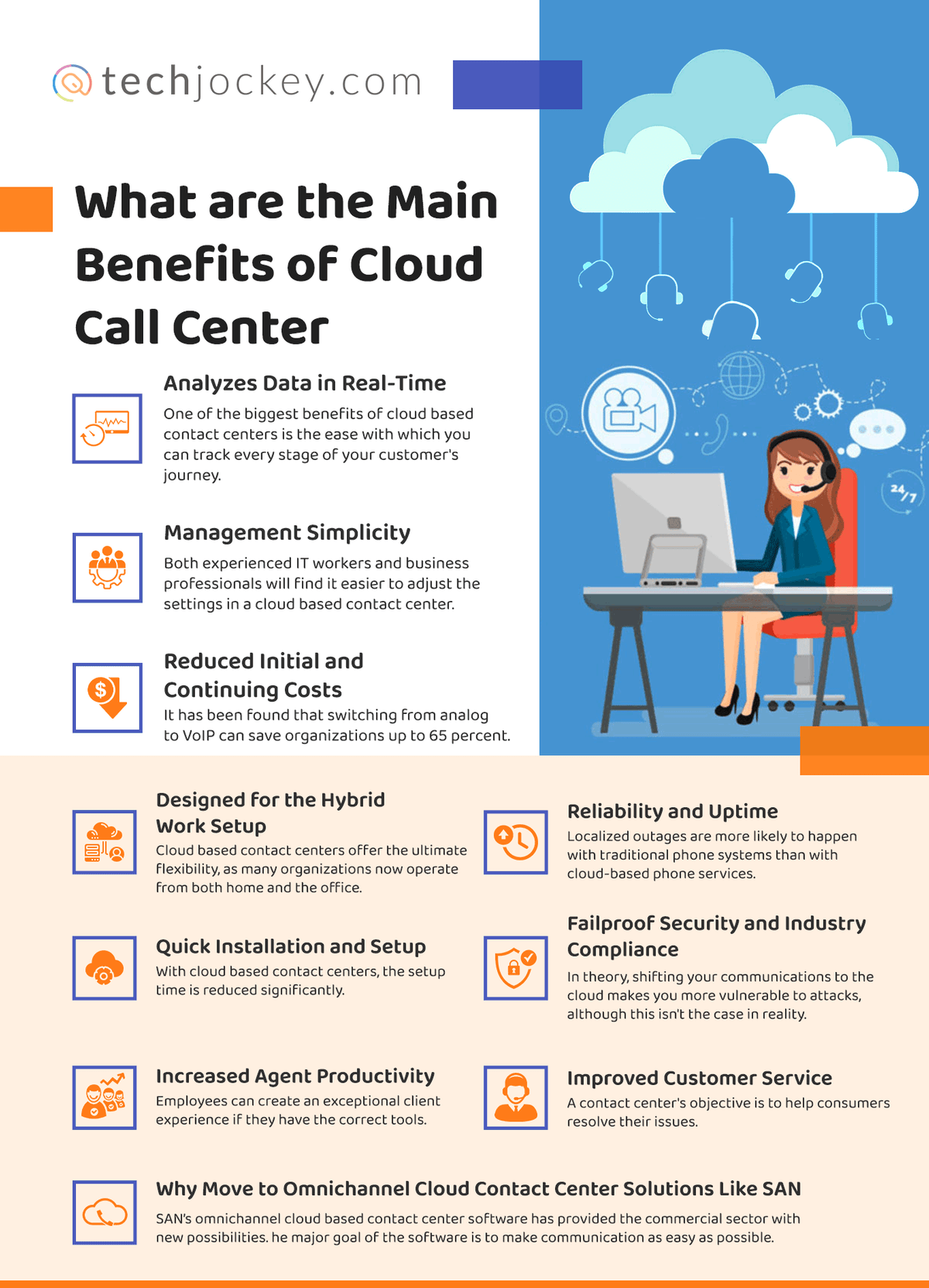Technology is ever-growing and every day it is getting more sophisticated, allowing for greater flexibility, cost savings, and convenience for a variety of enterprises. Contact centers are seeing the potential advantages of cloud-based solutions.
As a result, they are moving towards automated, and dependable cloud centers to fulfill changing customer behaviors and flexible business models.
In today’s web-based world, a cloud contact center gives businesses quick and easy access to the tools and services they need to interact. Before we dive into the advantages and features of a cloud contact center, let us figure what exactly is it.
What Is a Cloud Contact Center?
Cloud based call centers are specialized tools that provide innovative solutions to organizations for addressing their customer service challenges. They are becoming more widespread because cloud contact centre solutions can be accessed from anywhere.
It’s a centralized hub that allows virtual call centre agents and remote teams to manage inbound and outbound interactions through all possible channels.
Businesses are continuing to appreciate cloud-based platforms because they provide capabilities to drive customer satisfaction with quick response and timely service.
How Does Cloud Contact Center Work?
Cloud contact centers support omnichannel communication through incoming and outgoing calls, texts, social media interactions, and video communications services. All of these are conducted over a high-speed internet connection. In this scenario, the technical setup, equipment, and server maintenance are entirely handled by contact center providers.
With cloud contact centers, there is no need to install and maintain telecom hardware, unlike an on-premises facility. Instead, Voice over Internet Protocol (VoIP) technology or software is used to establish phone calls.
Suggested Read: What is Cloud Computing?
You can easily link the cloud contact center software to your other channels, such as social media or email. To avoid conflicts, each interaction is associated with an account and assigned to the appropriate agent. Then, in the background, the software syncs data with your CRM, ensuring that everyone is on the same page.
Because a contact center operates solely over the internet, you will just need to equip your employees with workstations, headphones, and an internet connection. Agents can then receive calls, emails, or chat messages when they log in. Consequently, your service reps can communicate with customers in a consistent manner across all communication channels.
Scalability: You can scale your consumption requirement on-demand, saving time and money on hardware upgrades.
Improved reliability: Because cloud platforms aggregate the needs of tens of thousands of users, they are more reliable than what most people can afford to implement on their own.
Elasticity at its best: You can simply scale up and down in response to changing needs without incurring any costs. When you need something, use it.
Cost management: Prototyping, building, deploying, and iterating quickly can all be done with little or no impact on your operating budget. You will certainly save a lot of money without compromising on quality.
What are the Cloud Contact Center Features?

There is no need for hardware in cloud-based data centers, which prevents the problem of equipment maintenance and updates. Cloud solutions, unlike conventional systems that need voice modules, additional software licenses, extension I/O cards, or other add-ons, allow you to rapidly extend workforce teams to meet the ebb and flow of client demand.
Importantly, the number of agents can be easily increased or decreased as needed. Say goodbye to acquiring unnecessary servers or storage, or hiring more IT staff. Your firm only needs to pay for what it utilizes with cloud based call center technologies.
Enterprise-class cloud contact center solutions offer the highest levels of availability, reliability, and disaster recovery. The infrastructure of leading solutions is housed in geographically redundant data centers, ensuring 99.99 percent uptime.
Data centers are manned with highly qualified personnel that oversee the system 24/7 and execute the newest upgrades to increase overall reliability.
Suggested Read: How to Effectively Manage a Call Centre Customer Service Team
Here are some basic features of cloud contact centers:
Omnichannel Support: A cloud contact center combines various communication channels into a single system. This feature allows your agents to connect directly with consumers or clients by phone, email, or instant messaging. All of these functions can be performed while maintaining a consistent record of all communications, irrespective of the mode of communication.
Call Routing: A typical cloud contact center such as SAN comes with an enhanced call-routing option. This feature is generally supported by an auto-attendant and, in certain cases, interactive voice response (IVR). Such an infrastructure ensures that your consumers and clients speak with a skilled person in the appropriate department at the quickest.
Round the Clock Support: A cloud contact center employs automated services like auto-attendant and music-on-hold to reduce the number of people needed to run your contact center. These technologies help organizations handle emergency calls until an agent is available.
Centralized Dashboard: State-of-the-art cloud contact center provides a centralized dashboard that helps them track specific metrics. These metrics include call waiting time, average call duration, and agent idle time. Being able to monitor these metrics enables team leaders and managers to better optimize the operations of their contact center.
Flexibility & Scalibility: Cloud contact center modules can be scaled as per the call volume. Your cloud call center vendor must provide instant support to help you agents deal with the increasing number of customer calls.
What are the Main Benefits of Cloud Contact Center?

Now let us discuss the main benefits of cloud based call center solutions:
- Analyzes Data in Real-Time
One of the biggest benefits of cloud based contact centers is the ease with which you can track every stage of your customer’s journey. Real-time dashboards and custom reports maximize your customer handling process.
It also aids in scheduling and labor optimization, ensuring that individuals are neither overworking nor squandering their time. The historical data can be used by call center managers and directors to forecast trends, satisfaction scores, and analyze cross-sections of client data.
You may build trust and accomplish growth by using cloud-based contact centers that keep everyone on the same page.
- Management Simplicity
Both experienced IT workers and business professionals will find it easier to adjust the settings in a cloud based contact center. When you need to make a quick modification or amend a user’s rights, you can do it right away. This flexibility allows you to control the system rather than the system controlling you.
Administrators have access to a secure web interface where they can manage all of the settings. If you need to make adjustments in the middle of the night, you can do it from anywhere on any connection. This adaptability comes in handy as businesses expand and introduce new services or products.
- Reduced Initial and Continuing Costs
It has been found that switching from analog to VoIP can save organizations up to 65 percent. A cloud based contact center eliminates the need to invest in real estate, backup power, numerous network carriers, security assessments, and other overhead costs to handle client applications.
A cloud-hosted PBX system is more cost-effective since it eliminates the need for expensive hardware and a large IT staff.
- Designed for the Hybrid Work Setup
Cloud based contact centers offer the ultimate flexibility, as many organizations now operate from both home and the office. Everyone will be always connected, no matter where they are. Supervisors and call center directors can stay in touch with their teams.
Contact centers hosted on cloud are designed to work on any device and operating system. They also offer real-time reporting to increase transparency in terms of efficiency and customer service.
End-to-end security is critical for consumer and employee privacy when people work remotely. Cloud call center solutions help to avoid data breaches.
- Quick Installation and Setup
With cloud based contact centers, the setup time is reduced significantly. As there is usually no hardware involved, you can personalize any module in minutes rather than months. Employee onboarding is quick, and you would not have to deal with repeated IT support requests.
Contact centers can begin linking client encounters from previous emails and other channels, in addition to handling inbound and outbound calls. With cloud based contact center solutions, you can access statistics regarding calls, surveys, and team performance within minutes.
- Increased Agent Productivity
Employees can create an exceptional client experience if they have the correct tools. Even today, businesses rely on outdated internal and external tools to manage customer service workflows. Productivity suffers as a result of this inefficiency. Ask any customer service representative about their sluggish tools, and they will undoubtedly mention the same.
With an optimized dashboard with the conversation history with every customer, cloud based contact centers put agents in the driver’s seat. It can help your team anticipate client requests and save hours of context switching.
Another amazing benefit is the click-to-call feature, which reduces misdials and speeds up outbound call placement. That’s not all, though. Artificial intelligence is used in cloud contact center platforms to fix client issues before they reach an agent. To improve the customer experience, they can intelligently direct incoming calls to the self service panel.
- Reliability and Uptime
Localized outages are more likely to happen with traditional phone systems than with cloud-based phone services. Severe weather, construction concerns, and even regional network disruptions are all potential hazards.
Cloud-based phone systems take a different approach. These are managed through specialized centres of the third party service providers. Cloud communication providers keep an eye on the network 24×7 to make sure everything is running well.
- Failproof Security and Industry Compliance
In theory, shifting your communications to the cloud makes you more vulnerable to attacks, although this isn’t the case in reality. Potential dangers can be neutralized by call encryption (TLS and SRTP), rights management, and thorough logging.
Cloud contact centers are subjected to audits to ensure that they meet the stringent requirements for processing credit card payments, discussing private medical information, and handling sensitive personal data. PCI-DSS, HIPAA with business associate agreements, and SOC 2 are some of the accreditations to search for.
On-premise solutions necessitate costly audits on a regular basis. But, more crucially, it compromises the confidentiality of consumers’ and staff’s information. Security updates, in particular, rely on IT professionals to deploy them on a regular basis.
- Improved Customer Service
A contact center’s objective is to help consumers resolve their issues. You must ensure that the customer finds it extremely convenient to contact you.
Think about how your consumers prefer to communicate. According to Microsoft’s Customer Service survey, over half of customers address their concerns using up to five distinct communication channels. As a result, keeping your consumers satisfied requires an omnichannel routing strategy.
Cloud contact centers provide agents with the resources they need to resolve their difficulties. These solutions fetch and segregate information from all possible channels to ensure that none of the customer query go unnoticed.
Why Move to Omnichannel Cloud Contact Center Solutions Like SAN?
SAN cloud based contact center software has provided the commercial sector with new possibilities. The major goal of the software is to make communication as easy as possible. It enables corporations to communicate effectively.
By lowering communication complexity and time, the program will allow you to be more productive than before. Because of the successful usage of SAN’s omnichannel contact center solution, collaboration has become easier, which is having a positive impact on the business sector.
Interestingly, SAN brings forward a unique blend of experience in Omni Channel Call Center Solutions, Work from Home Call Center Solutions, and Mobile Dialer. The organization’s superior telecom knowledge enriches its CRM features.
SAN also specializes in custom CRM creation and offers CTI connectivity with Zoho Desk, Zoho CRM, Leadsquared, SalesForce, Zendesk, Freshdesk, and a number of other applications.
Conclusion
For those dealing with an influx of customer and sales inquiries, a cloud-based contact center solution is ideal. It is a public secret that the advantages of transferring your contact center to the cloud outweigh the disadvantages of an on-premise solution.
A cloud call center cannot go wrong because of its unrivaled scalability. It is the best time for companies to transition to an omnichannel contact center.
There is a reason why businesses in the healthcare, logistics, and finance industries rely on cloud based contact centers. It is dependable and allows organizations to grow more quickly. Now is your time to ride the growth!
The Techjockey content team is a passionate group of writers and editors dedicated to helping businesses make informed software buying decisions. We have a deep understanding of the Indian software market and the challenges that businesses face when choosing the right software for their needs. We are committed... Read more




























